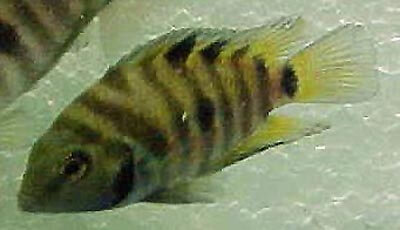
This is perhaps one of the most forgiving fish in the pet trade... they are amazing survivors and adaptors! However, they are not for the weak of heart and for those fishkeepers with peaceful community tank fish.
These fish are NOT known for their gentle dispositions, and need to be kept with other aggressive, larger fish that will hold their own (it can and will harass some fish to death). They have been known to pick fights with Oscars more than 3X's their size, and win! Best kept alone or with their own kind, but fascinating fish to watch.
Convicts are among the easiest bred fish in captivity, but watch out, make sure you know what you are getting yourself into when you get a pair.
This fish has no special requirements at all and is extremely hardy. It is great for beginners who are having trouble keeping more delicate species alive, but they must be prepared to see this territorial fighter in action if they want to keep them with other species, even other bad-attitude cichlids like red terrors and jack dempseys. If kept in the right setup, you will really see their amazing colors and behaviors come through--they are very entertaining fish. They can be fed a variety of foods, including flakes, cichlid pellets, frozen/live brine shrimp, blood worms, and vegetables like chopped-up spinach leaves. They are omnivorous, and not picky eaters, but very greedy.
Someone once described breeding convicts as "just add water and fish", and this is pretty accurate! An excellent fish for beginners to start breeding, but just be careful what you wish for... these fish breed at the drop of a hat and will produce many young.
The male and female will pair off, and do a mating dance that involves shaking their heads at one another. They prefer to lay their eggs on the inside of a flower pot, as shown in the picture, and both parents will usually dig a depression in the gravel around it. A breeding pair will vigorously defend their territory against encroaching fish, and will quickly push all the other inhabitants of the tank to the opposite corner. They are one of the very best when it comes to parental care, and will sometimes bury newborn fry when they are threatened, so don't be alarmed if they go missing for a day.
Fry usually hatch in under a week, and take another 3-4 days to consume their yolk sacs and become free-swimming (do not feed during this time). Once swimming on their own, they can be fed live microworms. They will also take fry powder foods and then eventually graduate to flake food.